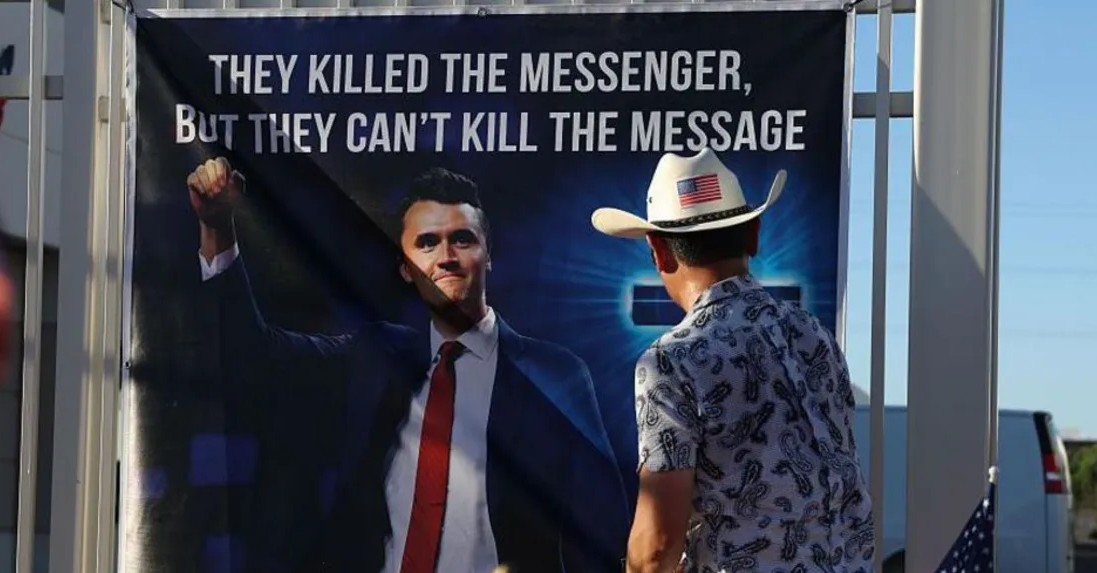One moment, tens of thousands gathered to mourn a life. The next, they watched something even more revealing: bitter words born of division. At Charlie Kirk’s memorial service in Glendale, Arizona, love and forgiveness stood on one stage and hatred on another.
He died for speaking ideas. But how people then responded says as much about America’s culture of political violence as his assassination ever could.
What Happened in Arizona
On September 21, 2025, State Farm Stadium in Glendale, Arizona, overflowed. Tens of thousands came to mourn and to make a statement. Speakers included Charlie’s widow Erika Kirk, President Donald Trump, Vice President J.D. Vance, and many others in the conservative movement.
Erika Kirk gave one of the most striking speeches. She opened with Isaiah 6:8, quoted her husband’s devotion to faith and truth, and then did something rare: she publicly forgave Tyler Robinson, the man charged with killing Charlie. She said, “My husband Charlie wanted to save young men, just like the one who took his life…” and embraced Christian teaching that “the answer to hate is not hate.”
Then Donald Trump took the mic. He praised Charlie as a “martyr for American freedom.” But he also drew a sharp contrast, declaring that, unlike Charlie, he does not forgive his opponents. “I hate my opponent,” Trump said.
Other speakers pledged to carry on Kirk’s legacy, to intensify efforts around free speech, faith, and conservative youth engagement. The event blended religion, political rallying, and raw emotion. Some in the crowd saw the service not only as a farewell but as a battle cry.
Why This Memorial Matters More Than Mourning
This was more than grief. It was an ideological battleground. What happened in Arizona exposed sharp truths:
- Forgiveness vs. Hatred: Erika’s speech embodied what many believe Christianity calls for—love, mercy, reconciliation. Trump’s words exposed how much bitterness and antagonism have become normalized, even in moments of supposed unity.
- Public Mood on Political Violence: The crowd, the turnout, the solemn applause… everything suggests that many in America see the fallout from Kirk’s death as proof that the war of ideas has turned real. When some leaders openly declare “hate” for their opponents, it lowers the barrier to violence. It normalizes it.
- Legacy & Leadership: With Erika stepping in as head of Turning Point USA, the organization Kirk founded, it’s clear his mission will continue, but contested terrain lies ahead. Will it be remembered as advancing faith, dialogue, peace, and truth? Or will it be subsumed into the same anger it fought against?
Echo Chambers and the Slide Toward Violence
Let’s anchor this in what polls and reports say:
- Major national surveys reveal that most Americans believe political violence is a “very big problem.”
- There are small but alarming pockets of people who say it would be “somewhat justified” to harm public figures under certain ideological disagreements. Whether left or right, this shows how far conversation has drifted toward danger. (These data often come from smaller non-representative polls, but they cannot be ignored.)
- Social media and partisan media fuel echo chambers: people hear the same lines over and over (“liberals hate freedom,” “conservatives want to censor”) until nuance, friendship, and compassion, even the idea of forgiveness, seem weak, irrelevant.
Responding to the New Narrative
Erika Kirk’s forgiveness is a powerful counter-narrative. She emphasized what Charlie lived: faith in God, love for enemies, and a hope for reconciliation. For those who cheered his death or embraced hatred, her words are a rebuke.
That’s exactly why leaders and media who encourage “hate your opponents,” who treat differences as moral offenses, are part of what enables political violence. Words matter. Choices matter.
Call to Courage
If we believe in faith, reason, and humanity, we have to choose courage:
- Speak truth without bitterness. Disagree, yes, but don’t dehumanize.
- Refuse to applaud violence. Whether physical violence or ideological violence. Crippling others with insults, silencing them, labeling them enemies, is violence too.
- Practice forgiveness. Not because it’s easy, but because it shows there’s something higher than the anger.
- Teach younger generations. Show them what conviction + compassion looks like. Debate with kindness. Live faith out loud.
The Final Word
At the memorial, we saw two responses: love and hatred. Christian forgiveness and political enmity. Faith and a rally. These are not just opposing themes. They represent what our society stands to lose or gain.
Charlie Kirk’s ideas were many things: faith, family, free speech. His life ended suddenly, violently. But at the memorial, through Erika’s tears, through Trump’s defiance, through the crowds, we saw his story continuing.
The mic is bloodstained. The grief is raw. But what we do from here is the legacy. Will we pick up the mic and amplify forgiveness, courage, truth? Or will we let resentment drown out everything he stood for.


